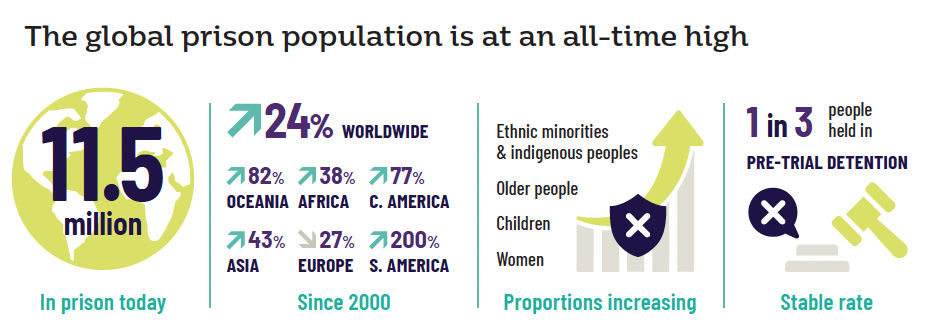
We've compiled top highlights from recent research, policy, and practice resources across the world for our latest IACFP International News summary. Our topics for September and October, 2022 include IACFP updates; new research on mental health and trauma-informed care; and resources for practice.
1. IACFP Updates
- The IACFP will be announcing nominations for President-Elect in October 2022. This will be followed by ballots being sent to IACFP members for the thirty-day voting period. Please respond when you receive your ballot.

- Frank Porporino, Ph.D., IACFP Past-President, provided the opening keynote address at the 5th World Congress on Probation and Parole in Ottawa, Canada. The title of his presentation was “Can Less Correctional Control Give Us More Public Safety: Working to Make Community Options More Effective.” In one hour, he was able to provide a summary of how probation and parole have become more about correctional control throughout the world; highlight research, policies and practices that are hopeful and evidence of transformation taking place; and provide a call to action.
Five points that he said would make what happens on probation matter are:- Probation needs to take better care of its staff.
- Staff need a meaningful say in how they change the nature of their work.
- Reframe understanding of RISK.
- Emphasize attitudes, values, and interpersonal style—not just skills.
- Promote a more nuanced, integrated theoretical understanding of the change process towards "desistance."
On the latter point, Dr. Porporino called for participants to embrace "model pluralism" to apply all that we know about the human change process (and about desistance from offending, in particular).

- IACFP Executive Director, Cherie Townsend, and IACFP Research Assistant, Sonya McLaren, presented “Building Community Capacity for Justice-Involved Individuals with Mental Health Treatment Needs” at the 5th World Congress on Probation and Parole. The presentation summarized the work that was funded by IACFP to advance research and support for effective mental health service delivery systems in community corrections worldwide. The workshop included a presentation by Ayaka Takai from Japan on the “Treatment of Offenders with Mental Health Problems in Japan."
2. Research
- Global Prison Trends 2022" was published in May 2022. It is a joint publication of Prison Reform International and the Thailand Institute of Justice. The report shares information and analysis on key trends and developments in prison. The 2022 issue not only documents the trends in the use of imprisonment, but also the changes and issues faced by people belonging to certain segments of prison populations. One of these is justice-involved individuals experiencing mental illness and mental health challenges.
One of the key messages in the report is that the mental health crisis in prisons is being ignored. The following is an excerpt from the report, “Mental health conditions remain disproportionately high among prison populations, and data suggests they are rising. New evidence points to the significant impact of COVID-19 restrictions in prisons on mental health, exacerbating the crisis. Yet, a lack of investment and attention means there is a dire lack of qualified mental health staff or services in a large proportion of prisons globally.”

- "What is trauma-informed practice? Towards operationalisation of the concept in two prisons for women" by Katherine M. Auty and Alison Liebling was recently published in the OnLine First version of Criminology and Criminal Justice. This article provides a summary of the research conducted on the cultural initiative, “Becoming Trauma-Informed,” that was introduced in prisons in England and Wales from 2015 based on the work of American clinical psychologist, Dr Stephanie Covington. It provides insight into the challenges of operationalizing this approach and measures its impact on the prison experience.
Two components of trauma-informed care, staff engagement and care and recognition, demonstrate how TIC may be an extension of “good prison practice,” When presented from this perspective, there may be a better opportunity for staff engagement if TIC is framed in terms of what is already meaningful to prison staff, rather than as an “add-on.” The authors write, “This factor (staff engagement) reflects the fact that prisons are highly relational environments. The quality of prisoners’ relationships with staff are central to the women’s experiences and are key to many of the principles of trauma-informed custodial care.”
The authors found that providing a trauma-informed environment, particularly for women prisoners, was particularly difficult. This was due to the exceptional rates of trauma that they bring to the environment, as well as the features of imprisonment. In terms of care and recognition, the authors found a strong correlation with existing MQPL dimensions (i.e., respect, humanity, and staff-prisoner relationships).
3. Policy and Practice
- In Ireland, the Minister for Justice, Helen McEntee, and the Minister for Health, Stephen Donnelly, recently published the report and recommendations of the High Level Taskforce established to consider the mental health and addiction challenges of people who come into contact with the criminal justice sector. The final report can be accessed here.
The recommendations include the following:- Development of a Community Access Support Team.
- Strengthening the existing adult caution scheme.
- Single system of governance for forensic mental health services across the Irish Prison Service and National Forensic Mental Health Service through prioritizing the development of further Intensive Care Rehabilitation Units.
- Development of safe areas in prisons to support prisoners returning to prison following treatment.
- Provision of specialist dual diagnosis services across the Irish Prison Service estate.
- Further development of the role of the existing Prison Inreach and Court Liaison Service.
- Reinforce the interconnection between relevant stakeholders.
- Expansion of Pre-release Planning Programme.
- Improvements to support systems on release from prison.

